Episodes
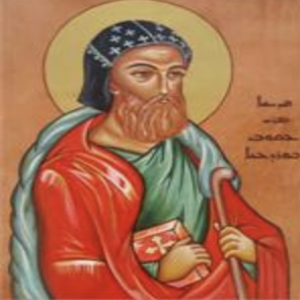
Saturday Mar 22, 2025
Jacob Baradaeus (c. 500–578) - Revival of the Syriac Orthodox Church
Saturday Mar 22, 2025
Saturday Mar 22, 2025
This podcast details the life and significant contributions of Jacob Baradaeus, a key figure in the 6th-century Syriac Orthodox Church. Facing intense imperial opposition, Baradaeus tirelessly worked to revive and organize the Miaphysite Christian community through extensive travel, strategic disguises, and the ordination of numerous clergy. His efforts led to the establishment of a distinct Syriac Orthodox Church, later known as the "Jacobite" Church. The text also highlights Baradaeus's travel habits, ascetic lifestyle, and the profound impact his itinerant ministry had on fostering trust and empowering local Christian communities, ensuring the church's survival and growth despite persecution.
To learn more Aramaic visit this website:

Monday Mar 24, 2025
John of Ephesus (c. 507-586 AD) - Life, Works, and Byzantine History
Monday Mar 24, 2025
Monday Mar 24, 2025
John of Ephesus, a 6th-century Syriac Orthodox bishop, is highlighted as a crucial historian providing a Miaphysite perspective on a turbulent era in the Byzantine Empire. His surviving "Ecclesiastical History" offers eyewitness accounts of religious persecution and wars, contrasting with Chalcedonian viewpoints. Furthermore, his "Lives of the Eastern Saints" illuminates the practices of Miaphysite communities. As a primary source and a voice for a marginalized religious group, John's writings offer invaluable insights into Byzantine society, religious controversies, and the interplay between Syriac and Greek cultures. His works are essential for understanding Late Antiquity and the diversity of early Byzantine Christianity.
for more online courses : www.twinsbiblicalacademy.com
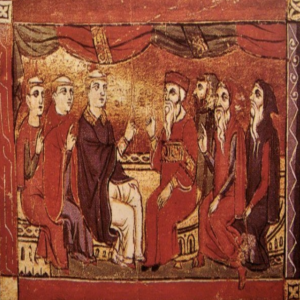
Tuesday Mar 25, 2025
Babai the Great (c. 551–628) - Architect of East Syrian Theology and Monasticism
Tuesday Mar 25, 2025
Tuesday Mar 25, 2025
Babai the Great, a significant figure in the early Church of the East (c. 551–628), is presented as a transformative leader who systematically defined its unique Christology and vigorously reformed its monastic practices. His work during a period of both external political strain and internal theological disputes was foundational, establishing key doctrinal and disciplinary frameworks for centuries. Babai's extensive writings, ecclesiastical leadership, and spiritual guidance profoundly shaped East Syrian Christianity, a legacy still recognized today. He notably integrated medical knowledge into theological discussions and developed contemplative reading practices within the monastic tradition.
For more in depth information go to our website: www.twinsbiblicalacademy.com

Wednesday Mar 26, 2025
Wednesday Mar 26, 2025
Henana of Adiabene, headmaster of the School of Nisibis, is presented as a significant yet controversial figure in Eastern Christian history. The text details his theological disagreements with established Antiochene traditions, leaning towards Byzantine thought and sparking significant ecclesiastical and political opposition. Despite the suppression of much of his work, his challenge to orthodoxy compelled important clarifications of Church of the East doctrine. The flourishing and subsequent decline of the School of Nisibis under his leadership are explored, alongside the political and intellectual climate that shaped the controversies surrounding him. Ultimately, Henana's story illustrates the complex dynamics of theological innovation and its reception within the context of late antique Christianity.
for more in depth studies this is our website: www.twinsbiblicalacademy.com
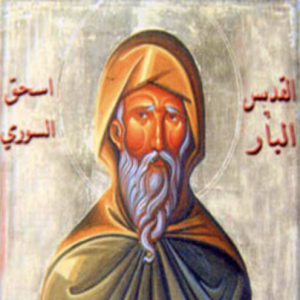
Thursday Mar 27, 2025
Thursday Mar 27, 2025
Isaac of Nineveh, a seventh-century spiritual writer from the Church of the East, is presented as a significant figure in Christian mysticism. The text outlines his life, marked by a brief stint as a bishop followed by a solitary ascetic existence focused on prayer and contemplation. His enduring legacy rests on his "Ascetical Homilies," which offer profound insights into Christian spiritual development and continue to influence various Christian traditions. Key aspects of his theology, including his understanding of divine love and the importance of stillness (hesychasm), are explored. While some controversy surrounds alleged universalist views, Isaac's impact is evident in his widespread veneration and recent inclusion in the Roman Martyrology. Scholars emphasize his profound contributions to Christian spirituality, highlighting the practical wisdom and depth found in his writings.
for more teachings you can visit www.twinsbiblicalacademy.com
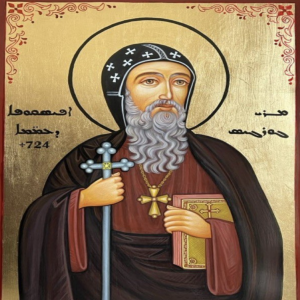
Friday Mar 28, 2025
George of the Arabs (c.660 - 724 AD) - A Syriac Intellectual in Early Islam
Friday Mar 28, 2025
Friday Mar 28, 2025
In this episode we will lean about the life and significant intellectual contributions of George of the Arabs, a Syriac Orthodox bishop who lived from the mid-7th to early 8th century. Serving Arab Christian tribes during the early Islamic period, George was a prolific scholar known for his translations and commentaries on Aristotle, his completion of Jacob of Edessa's Hexaemeron, and various theological and liturgical writings. His work bridged Greek philosophical thought with Syriac intellectual traditions during a time of major cultural and political change in the Near East. As a key figure in this era, George's legacy highlights the continued intellectual exchange across linguistic and religious boundaries.
check our online courses: www.twinsbiblicalacademy.com
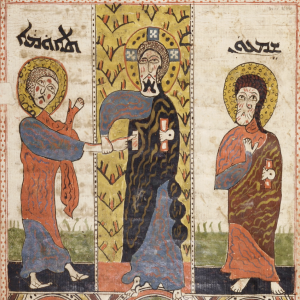
Saturday Mar 29, 2025
John bar Penkaye (c. 610 - 693 AD) - A Late Seventh-Century World History
Saturday Mar 29, 2025
Saturday Mar 29, 2025
John bar Penkaye, a seventh-century East Syriac historian and theologian, is the subject of these texts, which highlight his significant work, Ktâbâ d-rêš mellê (Summary History of the World). This fifteen-book history provides a rare contemporary perspective on events up to the late 600s AD, including early Islamic conquests and social conditions in Mesopotamia. The work blends historical narrative, spanning from creation to his present day, with theological interpretations, examining themes such as biblical history, paganism, Christology, the rise and fall of empires, and apocalyptic expectations. Notably, bar Penkaye views the Byzantine-Persian conflicts and subsequent Arab conquests through a religious lens, interpreting them as divine judgment and part of God's plan.
For more teachings follow our website: www.twinsbiblicalacademy.com
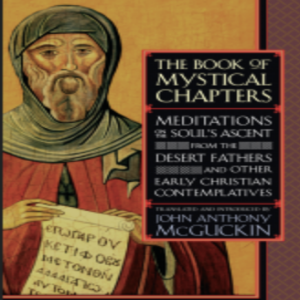
Sunday Mar 30, 2025
John of Dalyatha (c. 690–c. 780 AD) - Life, Writings, and Reception
Sunday Mar 30, 2025
Sunday Mar 30, 2025
This podcast details the life and spiritual contributions of John of Dalyatha, a 8th-century monk and mystic from the Church of the East, highlighting his ascetic practices and writings focused on achieving union with God. Despite initial condemnation for alleged heresies, his works, emphasizing themes like repentance, contemplation, and the struggle against evil, circulated widely across various Christian traditions through translations and adaptations. The text also explores the reasons behind his condemnation and subsequent rehabilitation, reflecting theological tensions within the early church. Ultimately, John of Dalyatha's enduring influence on Christian mystical thought is underscored by the widespread dissemination and appreciation of his teachings beyond the confines of his original ecclesiastical context.
For more teachings check our website: www.twinsbiblicalacademy.com
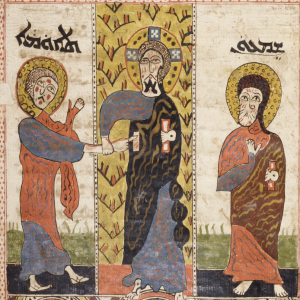
Monday Mar 31, 2025
Ishodad of Merv (mid-9th century) - An Eastern Syriac Bishop
Monday Mar 31, 2025
Monday Mar 31, 2025
in this last episode of the early Syriac church fathers we will learn about Ishodad of Merv (mid-9th century) was an East Syriac bishop and biblical commentator known for his scholarly contributions to the Church of the East. His epithet “of Merv” suggests he may have been born in the city of Merv in Central Asia (modern Turkmenistan), though this is not certain. He became the bishop of Ḥdatta (Haditha) in Assyria, near the Great Zab river in what is now northern Iraq, around 837 CE. In 852/853, after the death of Patriarch Abraham II, Ishodad was put forward as a candidate for Catholicos-Patriarch of the Church of the East.
For more in depth biblical studies this is our website:
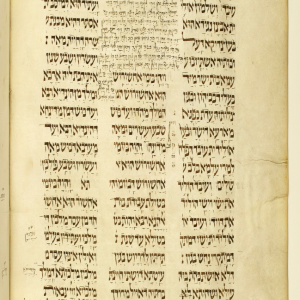
Tuesday Apr 22, 2025
Introduction for The Aramaic Portion of the Book of Daniel
Tuesday Apr 22, 2025
Tuesday Apr 22, 2025
🗓️ Embark on an enlightening journey with our course, Discover the Book of Daniel - A Hebraic/Aramaic Journey. This program is meticulously designed for believers who are eager to delve deep into the profound teachings and historical context of the Book of Daniel. Through this course, participants will explore the rich Hebraic and Aramaic roots of the text, uncovering layers of meaning that are often overlooked in traditional studies.
6 In-Depth online Lectures – Explore Daniel’s prophetic visions, historical narratives, and theological insights.
Lecture 1 - Chapter 2: The interpretation of Nebuchadnezzar's dream of the great statue.
Lecture 2 - Chapter 3: The story of the fiery furnace and the deliverance of Shadrach, Meshach, and Abednego.
Lecture 3 - Chapter 4: Nebuchadnezzar’s second dream and his period of madness.
Lecture 4 - Chapter 5: The writing on the wall during Belshazzar’s feast.
Lecture 5 - Chapter 6: Daniel in the lion’s den under King Darius.
Lecture 6 - Chapter 7:1-28 – A prophetic vision
The vision of the four beasts and the Ancient of Days, representing future kingdoms and God’s ultimate authority.
To buy all the course click the link below

